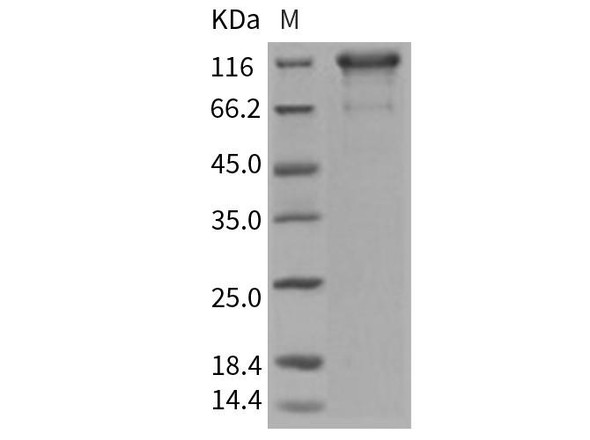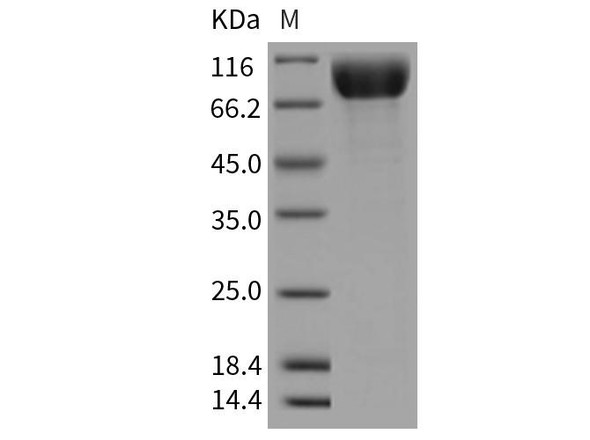Description
| Product Name: | Human PDGFRA Recombinant Protein |
| Product Code: | RPPB0844 |
| Size: | 5µg |
| Species: | Human |
| Target: | PDGFRA |
| Synonyms: | Platelet-derived growth factor receptor alpha polypeptide, PDGFR2, PDGF-R-alpha, CD140 antigen-like family member A, CD140a antigen, alpha-type platelet-derived growth factor receptor, RHEPDGFRA, rearranged-in-hypereosinophilia-platelet derived growth factor receptor alpha, PDGFRA/BCR fusion protein, MGC74795, EC 2.7.10.1. |
| Source: | Escherichia Coli |
| Physical Appearance: | Sterile Filtered colorless solution. |
| Formulation: | The PDGFRA solution (0.5mg/ml) contains 20mM Tris-HCl buffer (pH 8.0), 1mM DTT, 0.1M NaCl and 20% glycerol. |
| Stability: | Store at 4°C if entire vial will be used within 2-4 weeks. Store, frozen at -20°C for longer periods of time. For long term storage it is recommended to add a carrier protein (0.1% HSA or BSA).Avoid multiple freeze-thaw cycles. |
| Purity: | Greater than 85% as determined by SDS-PAGE. |
| Amino Acid Sequence: | MGSSHHHHHH SSGLVPRGSH MQLSLPSILP NENEKVVQLN SSFSLRCFGE SEVSWQYPMS EEESSDVEIR NEENNSGLFV TVLEVSSASA AHTGLYTCYY NHTQTEENEL EGRHIYIYVP DPDVAFVPLG MTDYLVIVED DDSAIIPCRT TDPETPVTLH NSEGVVPASY DSRQGFNGTF TVGPYICEAT VKGKKFQTIP FNVYALKATS ELDLEMEALK TVYKSGETIV VTCAVFNNEV VDLQWTYPGE VKGKGITMLE EIKVPSIKLV YTLTVPEATV KDSGDYECAA RQATREVKEM KKVTISVHEK GFIEIKPTFS QLEAVNLHEV KHFVVEVRAY PPPRISWLKN NLTLIENLTE ITTDVEKIQE IRYRSKLKLI RAKEEDSGHY TIVAQNEDAV KSYTFELLTQ VPSSILDLVD DHHGSTGGQT VRCTAEGTPL PDIEWMICKD IKKCNNETSW TILANNVSNI ITEIHSRDRS TVEGRVTFAK VEETIAVRCL AKNLLGAENR ELKLVAPTLR SE |
PDGFRa is a cell surface tyrosine kinase receptor for PDGF family members. PDGFRa binds to both A and B subunits of PDGF. It is known that PDGFRa is vital for kidney development since mice heterozygous for the receptor display defective kidney phenotypes.
PDGFRA Human Recombinant produced in E.coli is a single, non-glycosylated polypeptide chain containing 522 amino acids (24-524) and having a molecular mass of 58.4 kDa.The PDGFRA is fused to a 20 amino acid His-Tag at N-terminus and purified by proprietary chromatographic techniques.
| UniProt Protein Function: | PDGFRA: a receptor tyrosine kinase of the PDGFR family that binds members of the platelet-derived growth factor family. The identity of the growth factor bound determines whether the functional receptor is a homodimer or a heterodimer, composed of both PDGFR-alpha and -beta. Ligand binding induces receptor dimerization and autophosphorylation. Particularly important for kidney development since mice heterozygous for the receptor exhibit defective kidney phenotypes. Chromosomal rearrangments activate PDGFRalpha by fusion to BCR, causing atypical chronic myelogenous leukemia (CML), and to FIP1L1, causing idiopathic hypereosinophilic syndrome. Activating point mutations cause a minority of gastrointestinal stromal tumors (GIST). Promoter polymorphisms linked to neural tube defects including spina bifida, verified by mouse mutant model. Inhibitors: Gleevec, Sutent. OMIM: Two alternatively-spliced isoforms have been described. |
| UniProt Protein Details: | Protein type:Protein kinase, tyrosine (receptor); Oncoprotein; Kinase, protein; Membrane protein, integral; Protein kinase, TK; EC 2.7.10.1; TK group; PDGFR family Chromosomal Location of Human Ortholog: 4q12 Cellular Component: microvillus; membrane; integral to plasma membrane; cytoplasm; plasma membrane; nucleus; intrinsic to plasma membrane; external side of plasma membrane Molecular Function:vascular endothelial growth factor receptor activity; protein binding; protein homodimerization activity; platelet-derived growth factor binding; platelet-derived growth factor receptor binding; platelet-derived growth factor alpha-receptor activity; transmembrane receptor protein tyrosine kinase activity; ATP binding Biological Process: estrogen metabolic process; extracellular matrix organization and biogenesis; peptidyl-tyrosine phosphorylation; regulation of chemotaxis; wound healing; nerve growth factor receptor signaling pathway; viral reproduction; protein amino acid autophosphorylation; platelet-derived growth factor receptor signaling pathway; cardiac myofibril assembly; palate development; elevation of cytosolic calcium ion concentration; positive regulation of fibroblast proliferation; Leydig cell differentiation; embryonic digestive tract morphogenesis; luteinization; positive regulation of cell proliferation; male genitalia development; epidermal growth factor receptor signaling pathway; phosphoinositide-mediated signaling; fibroblast growth factor receptor signaling pathway; in utero embryonic development; adrenal gland development; positive regulation of phosphoinositide 3-kinase activity; embryonic cranial skeleton morphogenesis; odontogenesis of dentine-containing teeth; embryonic skeletal morphogenesis; positive regulation of phosphoinositide 3-kinase cascade; cell activation; innate immune response; hemopoietic progenitor cell differentiation; positive regulation of DNA replication; lung development; positive regulation of cell migration Disease: Gastrointestinal Stromal Tumor; Hypereosinophilic Syndrome, Idiopathic |
| NCBI Summary: | This gene encodes a cell surface tyrosine kinase receptor for members of the platelet-derived growth factor family. These growth factors are mitogens for cells of mesenchymal origin. The identity of the growth factor bound to a receptor monomer determines whether the functional receptor is a homodimer or a heterodimer, composed of both platelet-derived growth factor receptor alpha and beta polypeptides. Studies suggest that this gene plays a role in organ development, wound healing, and tumor progression. Mutations in this gene have been associated with idiopathic hypereosinophilic syndrome, somatic and familial gastrointestinal stromal tumors, and a variety of other cancers. [provided by RefSeq, Mar 2012] |
| UniProt Code: | P16234 |
| NCBI GenInfo Identifier: | 129892 |
| NCBI Gene ID: | 5156 |
| NCBI Accession: | P16234.1 |
| UniProt Secondary Accession: | P16234,Q6P4H5, Q96KZ7, Q9UD28, B2RE69, E9PBH0, |
| UniProt Related Accession: | P16234 |
| Molecular Weight: | 1089 |
| NCBI Full Name: | Platelet-derived growth factor receptor alpha |
| NCBI Synonym Full Names: | platelet-derived growth factor receptor, alpha polypeptide |
| NCBI Official Symbol: | PDGFRA�� |
| NCBI Official Synonym Symbols: | CD140A; PDGFR2; PDGFR-2; RHEPDGFRA�� |
| NCBI Protein Information: | platelet-derived growth factor receptor alpha; PDGF-R-alpha; CD140a antigen; PDGFRA/BCR fusion; CD140 antigen-like family member A; platelet-derived growth factor receptor 2; alpha-type platelet-derived growth factor receptor; rearranged-in-hypereosinophilia-platelet derived growth factor receptor alpha fusion protein |
| UniProt Protein Name: | Platelet-derived growth factor receptor alpha |
| UniProt Synonym Protein Names: | Alpha platelet-derived growth factor receptor; Alpha-type platelet-derived growth factor receptor; CD140 antigen-like family member A; CD140a antigen; Platelet-derived growth factor alpha receptor; Platelet-derived growth factor receptor 2; PDGFR-2; CD_antigen: CD140a |
| Protein Family: | Platelet-derived growth factor receptor |
| UniProt Gene Name: | PDGFRA�� |
| UniProt Entry Name: | PGFRA_HUMAN |










